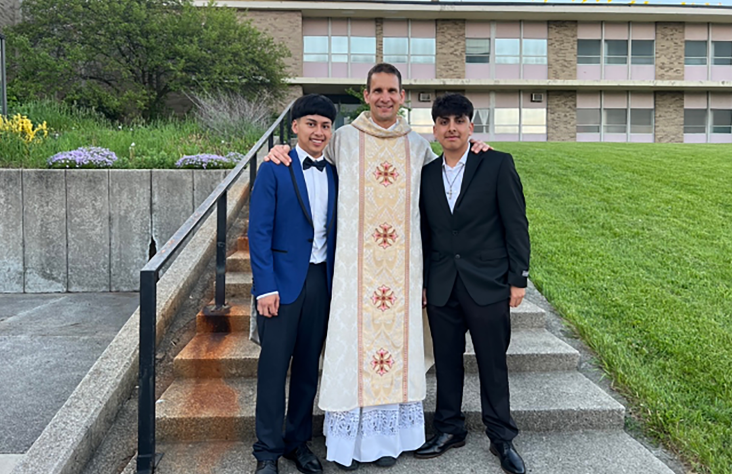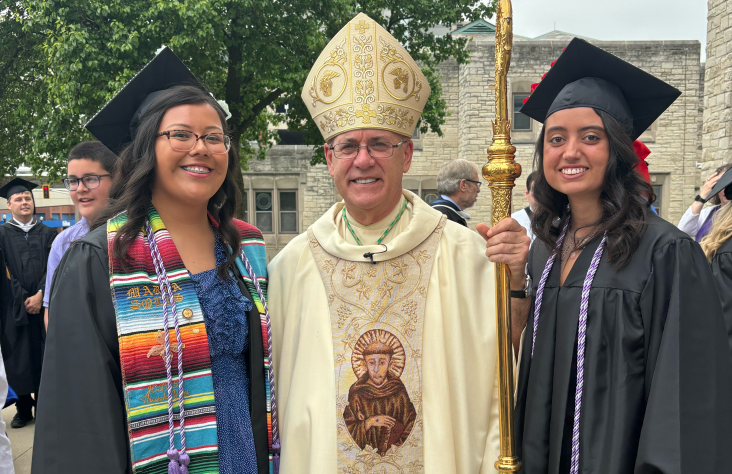February 7, 2013 // Uncategorized
Creation story isn't science but reveals God's love, pope says
VATICAN CITY (CNS) — The biblical account of creation isn’t a textbook for science, Pope Benedict XVI said.
Instead, the first chapter of Genesis reveals the fundamental truth about reality: that the world is not the result of chaos, but is born of and continually supported by God’s love, the pope said Feb. 6 at his weekly general audience.
In a series of Year of Faith audience talks about the creed, Pope Benedict touched on the description of God as “creator of heaven and earth.”
In an age of science and advanced technology, how are Catholics supposed to understand the Old Testament account of creation that says God created the heavens and earth in six days, and rested on the seventh? the pope asked.
“The Bible isn’t meant to be a manual of natural science,” the pope told the estimated 5,000 visitors and pilgrims gathered for his audience. “Instead it is meant to make understandable the authentic and deep truth of all things,” he said.
The creation account in Genesis reveals the fundamental truth that “the world is not a collection of opposing forces, but has its origin and steadiness in the Word, in the eternal reason of God, who continues to sustain the universe,” the pope said.
The creation story also points to the fact, he said, that God has a plan for the world and for humanity, a plan that gives people “the courage to face the adventure of life with trust and hope.”
It shows that everything God creates is “beautiful and good, filled with wisdom and love; God’s creative action brings order, leads to harmony and gives beauty,” Pope Benedict said.
God created man and woman in his image and breathed life into the human form he molded out of clay from the earth, according to Genesis, the pope said. The biblical affirmation means that humanity is not self-made or god-like, but is united by the same origin despite cultural, historical and social differences.
It also means, he said, that “we all carry in us the vital breath of God, and every human life, the Bible tells us, is under the specific protection of God.”
“This is the most profound reason behind the inviolability of human dignity against every temptation to measure a person’s worth using criteria of utility and power,” he said.
The description of the Garden of Eden means that God gave humanity, “not a wild forest, but a place that protects, nourishes and sustains,” he said.
“Man must not see the world as his own property to pillage and exploit, but as a gift from God” to safeguard and develop with respect “following the rhythms and logic” of God’s plan.
But while God created “a universe of goodness, harmony and beauty,” human beings freely chose to believe in lies over the truth and, in that way, that brought evil into the world, the pope said.
The symbol of the serpent reflects the “constant temptation to abandon (man’s) mysterious alliance with God,” he said.
The serpent doesn’t reject God but instigates suspicion by suggesting that following God’s word is somehow “a chain that binds, that deprives one of freedom and the most beautiful and precious things in life,” the pope said.
But breaking one’s relationship with God through sin destroys every human relationship, and only God, who is always reaching out with his loving hand, can restore things the right way.
“Through the saving obedience of Christ, the new Adam, God himself has justified us and enabled us to live in freedom as his beloved sons and daughters.”
At the end of the audience talk, the pope greeted members of the Conventual Franciscans who recently held their 200th general chapter in Assisi. The pope urged them to show the men and women of today “the beauty of following the Gospel in simplicity and fraternity.”
– – –
Editor’s Note: A video report on the pope’s audience remarks is available on CNS client websites likehttp://www.catholicidaho.org and at http://www.youtube.com/user/CatholicNewsService.
The text of the pope’s audience remarks in English will be posted online at www.vatican.va/holy_father/benedict_xvi/audiences/2013/documents/hf_ben-xvi_aud_20130206_en.html.
The text of the pope’s audience remarks in Spanish will be posted online at www.vatican.va/holy_father/benedict_xvi/audiences/2013/documents/hf_ben-xvi_aud_20130206_sp.html.
The best news. Delivered to your inbox.
Subscribe to our mailing list today.





